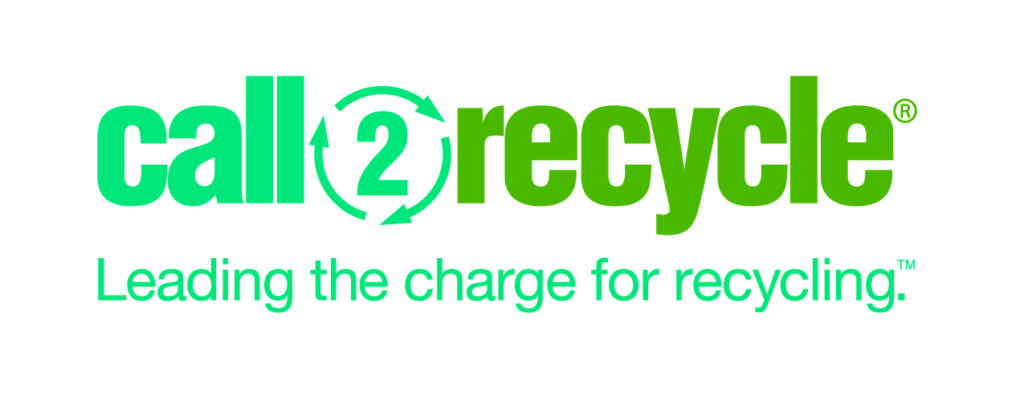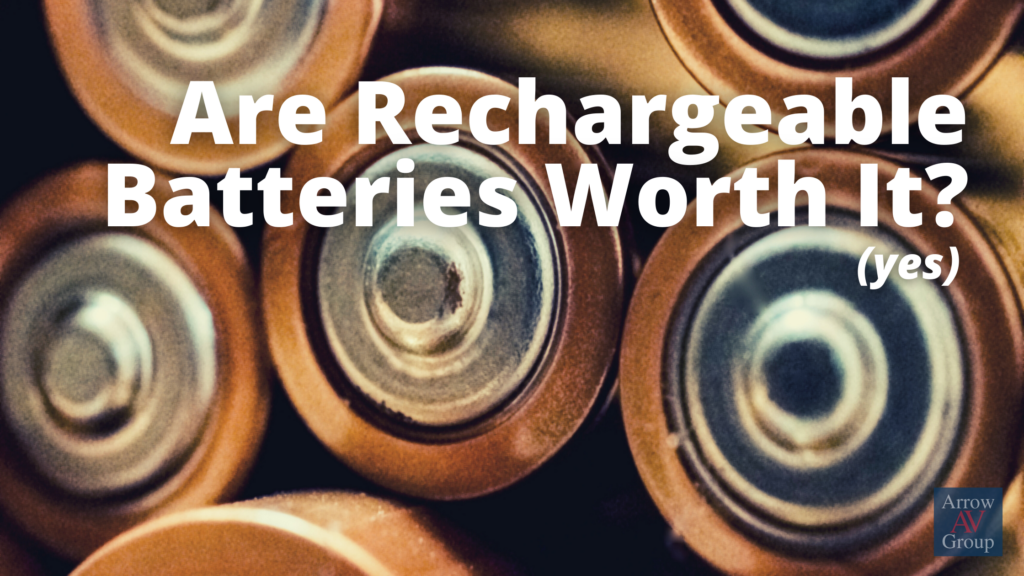
Are Rechargeable Batteries Worth It? [Interactive Graph]
Published April 30, 2021
Many of our customers ask if the rechargeable batteries used in portable or wireless AV devices are worth the extra initial investment. In short, the answer is yes.
While single-use batteries are a low initial cost, they present several challenges and ultimately cost you more money in the long run.
When on a tight budget, you might think cutting out the rechargeable batteries from your design is best for you. In this article, we’ll present three reasons why rechargeable batteries are essential for every project (and the world).
Save Your Money
On average, rechargeable batteries recoup their initial investment after 3-4 years of use and won’t drain your wallet long term.
How’d we figure that out? One of the most common portable devices we install are wireless microphones. Used in performance spaces, classrooms, and other communal rooms requiring amplification or recording, we’ll be using wireless microphones as an example throughout.
So let’s imagine you use 10 Shure SLX-D microphones for a weekly occurring event.
With single-use batteries, you would probably have a little bit of juice left but not enough to get you through next week’s event. So, you’re forced to toss them in leu of a dead mic mid-performance.
That means you would use 20 batteries a week. Multiply that by 52 and you’re using 1,040 batteries and (hopefully) recycling roughly 52 pounds of materials every year. Those costs start to add up.
Explore the chart below to see how the number of microphones affects the costs.

The chart above figures you’re buying in bulk at the start of every year the cheapest possible batteries (Amazon Basics AA) with a few spares and using an online recycling program like Call2Recycle once a year, which will charge you a fee to properly recycle single-use batteries.
For the rechargeable batteries, we factored in the one-time cost of charging stations and then replacing and recycling the batteries every five years. Fun fact: recycling of rechargeable batteries is much more accessible and convenient than single-use batteries. Check out Call2Recycle’s locator page for locations near you.
Even with this best-case scenario, single-use batteries will drain your funds long-term.
Save Your Time
On average, a wireless handheld microphone or belt pack transmitter requires about 12-15 seconds to change. This seems nominal when only using one or two microphones but if you have to mic a panel of speakers, a band, or a theatrical performance, saving a few seconds makes a big difference.
Let’s say an event tech or employee has to change out the batteries on 10 microphones every week. They are the fastest battery changer in the wild west and can change each microphone in 12 seconds flat.
Two minutes later, they’re done and ready to go! Well, they were fast but they accidently flipped the polarity of the batteries. There’s some more time to flip those batteries but let’s stick with the two minutes.

Two minutes a week for 52 weeks a year is 104 minutes a year. An hour and 40 minutes spent changing batteries or the run time plus two minutes of the 1942 classic movie, Casablanca. For every microphone you add, add another 10.4 minutes.
Doing the right thing and recycling your single-use batteries, each battery needs to be put in a separate plastic bag or have electrical tape on either end to reduce the risk of a fire hazard. You could probably watch Casablanca a few times while taping all 1,040 batteries.
Many manufacturers are creating docking stations for their devices to overcome this time challenge. For the Shure SLX-D, there are single and double charging docks, able to charge handheld and belt pack microphones. No replacing batteries every time, just grab and go to get started. When you’re done, dock it and forget about it. Intelligent charging means you’re getting the most out of your rechargeable batteries.
The choice is yours: watch an entire movie or change batteries?
Save Your Planet
You can’t do it all by yourself. But if each of us contribute by properly reducing and recycling, we can hopefully spend a few more years on this floating, molten rock we call Earth.
According to a 2016 study by the Australian National University, “The recycling of lithium-ion batteries reduces energy consumption, reduces greenhouse gas emissions, and results in considerable natural resource savings when compared to landfill.”
If you toss your batteries into the trash, they will end up in a landfill. Batteries in landfills have been known to leak toxic chemicals and heavy metals into nearby habitats, contaminating the environment.
When you recycle, manufacturers don’t have to mine for virgin materials. You’re giving materials a second life to create new batteries, golf clubs, silverware, and other metallic products.
So, if you like living here, recycle!
What’s the Verdict?
Are rechargeable batteries worth it? Absolutely yes. They’re better for your wallet, your time, and the world we live in.
It should be noted there are several different types of rechargeable batteries:
- Lithium Ion
- Nickel Metal Hydride
- Nickel Cadmium
Of those types, the Lithium Ion batteries provide the best voltage and current capacity and are most comparable to single-use alkaline batteries in performance. Not all of these battery types are rechargeable either. Many Lithium Ion batteries are NOT rechargeable and those that are will state it specifically. It is important to buy the correct type designed for your AV device. When in doubt, contact the manufacturer or an integrator like us to answer any of your questions.
Worried about your audiovisual system’s energy efficiency? Send Arrow AV Group a message for help putting together an energy efficient design.
Get Expert AV Assistance
Latest Blogs
About Arrow AV Group
We are a premiere audiovisual integration firm serving corporate, government, healthcare, house of worship, and education markets with easy-to-use solutions that drive success. Family-owned and operated from Appleton, WI for over 35 years.





